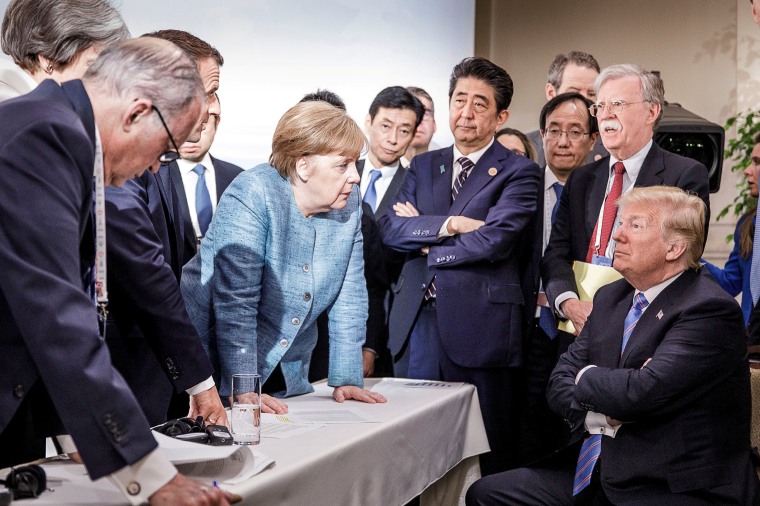Ric Grenell, who made a curious transition from notorious Internet troll to high-ranking Trump administration, delivered remarks at the Republican National Convention this week, telling voters what an impressive diplomatic force the incumbent president is.
"As U.S. Ambassador to Germany, I had a front row seat to Donald Trump's 'America First' foreign policy," Grenell said. "I wish every American could see how President Trump negotiates on their behalf. I've watched President Trump charm the Chancellor of Germany...."
As it turns out, the claim did not go unnoticed in Berlin. The New York Times reported today:
Chancellor Angela Merkel of Germany refuses as a rule to comment on the internal affairs of other countries or pass judgment on their leaders. The president of the United States is no exception. But that hasn't stopped her from letting her face do the talking, reflecting confusion, befuddlement or exasperation regarding President Trump as the situation required. On Friday, she was at it again.
Merkel held a summer news conference -- which is apparently an annual event -- at which a reporter asked about Grenell's assertion that Trump had "charmed" her.
"He did what?" the chancellor asked, sparking laughter. When the reporter repeated Grenell's choice of words, Merkel demurred.
I don't speak a word of German, but the look on her face suggested the German leader had not, in fact, been won over by her American counterpart.
What's more, we need not rely entirely on entertaining body language. In May 2019, Merkel spoke at Harvard's commencement, and much of her speech was devoted to defending principles of respect and inclusion. "Walls of ignorance and narrowmindedness may exist between family members as well as between groups within society, between people of different skin colors, nations and religions," she said. "I would like to see us break down these walls."
Merkel added, "I want to leave this wish with you: Tear down walls of ignorance and narrowmindedness, for nothing has to stay as it is."
She didn't specifically reference the current occupant of the Oval Office, but he and his allies seemed rather certain the German chancellor was taking a not-so-subtle shot in his direction.
Around the same time, as the American president suggested four American congresswomen should "go back" to the "places from which they came," Merkel publicly sided with the attacked lawmakers.
A year earlier, Trump attended a NATO summit that began with the Republican admonishing Merkel's government in ways that didn't really make sense.
It came on the heels of the German leader complaining at a conference that Trump's willingness to circumvent global rules had sparked a "real crisis" in the multilateral order.
Just two months into his presidency, Trump welcomed Merkel to the Oval Office for one of the most awkward White House photo-ops in recent memory, featuring the chancellor asking if the two should shake hands for the cameras, and the Republican ignoring her.
The same afternoon, the American president made a bizarre joke about the NSA having monitored Merkel's communications, needlessly raising a point of contention between the two countries in order for Trump to further an anti-Obama conspiracy theory.
As we discussed at the time, Trump also repeatedly complained about Merkel during his 2016 campaign, accusing her of "ruining Germany" and being a "catastrophic leader." The Republican even tried to start an anti-Clinton hashtag campaign: "#AmericasMerkel." It wasn't intended as a compliment.
Sure, Merkel's press-conference reaction was funny today, but we didn't need to see her facial expression to know Ric Grenell's "charm" assertion was literally unbelievable.
Postscript: For the record, the European edition of Politico had a report in June 2018 that said, "It's difficult to overstate just how enraged Germany is about Trump. By questioning and criticizing such bastions of the Western order as NATO, the World Trade Organization and even the EU, Trump has thrust Germany's leadership into an existential torpor it has yet to escape."
Around the same time, a senior German official told the New Yorker's Susan Glasser, "It took Germany the longest of all partners to come to terms with someone like Trump becoming president. We were very emotional, because our relationship with America is so emotional -- it's more of a son-father relationship -- and we didn't recognize our father anymore and realized he might beat us."
